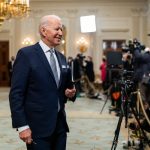As Election Day approaches, Vice President Kamala Harris finds herself in the hot seat over her so-called economic “plan.” During a special Sunday airing of 60 Minutes, host Bill Whitaker put Harris through the wringer, probing her on the nitty-gritty of her fiscal fantasies and how she plans to push them through a Congress that’s as divided as the nation itself. Spoiler: it didn’t go well.
When directly questioned about how to fund her economic agenda, Harris launched into her standard mumbo-jumbo about investing in small businesses and the middle class, exclaiming that they are the backbone of America’s economy. This tidbit, while nice in theory, didn’t answer the most pressing question—how does she plan to pay for it? Whitaker, clearly unimpressed by her platitudes, pressed on, reminding her of the crucial point that voters care about funding, not just feel-good rhetoric.
60 Minutes host tells Kamala during interview 'we're dealing with the real world' after unsatisfactory answer to questions about passing policy in divided Congress
“My plan is about saying that when you invest in small businesses, you invest in the middle class, and you… pic.twitter.com/KIZSYn9ku1
— Trump2024_no_matter_what (@TexasTrump2024) October 7, 2024
Instead of laying out a detailed plan, Harris shifted tactics and started parroting the line about billionaires and corporations paying their “fair share” in taxes. While it’s a familiar approach for her, it fell flat when taken to task about the difficulty of passing such tax hikes through a Congress more polarized than ever. While Harris attempted to sound convincing, her response revealed just how unprepared she was to deal with real-world constraints. Whitaker couldn’t help but point out the gap between her lofty ideals and the gritty reality of governance.
Critics were quick to dissect the interview online, with many calling attention to her failure to deliver straightforward answers. Comments ranged from mocking her non-responses to outright disbelief over her ineptitude. When voters are looking for strong, clear leaders, Harris’s inability to hit the mark might just cost her campaign more than a few points in the polls.
Harris’s economic vision embodies a starkly expansive, government-led approach to addressing the challenges facing regular Americans. Her menu of promises includes a variety of tax cuts and assistance for homebuyers that aim to alleviate financial burdens on families. Yet evidence suggests that these are mere Band-Aids rather than the cure for systemic economic issues, which stem from over-regulation and inefficiencies in the market. What might genuinely help middle-class families is not more government intervention but a reduction in the regulatory nonsense that makes it harder for citizens to live their lives freely.
Let’s not overlook the meddlesome nature of her ambitious “opportunity economy” plan. With proposals for government subsidies to boost small businesses and American manufacturing, the road ahead seems paved with good intentions but potentially paved with pitfalls. While bans on price gouging and expanded consumer protections sound noble, such government interventions can lead to unintended consequences, lowering competition and potentially driving up prices for everyone.
It’s fascinating to note that since she was nominated for the presidential ticket, Harris has only graced national television in a couple of interviews. As she gears up for a media blitz involving appearances on daytime talk shows and late-night venues, one can’t help but wonder if she’s trying to distract from the hard questions instead of answering them. With Tim Walz making his rounds, too, one has to question whether these appearances are just a desperate attempt to boost her image rather than engage with the tough economic debates. Harris certainly has her work cut out for her as this election season heats up.




